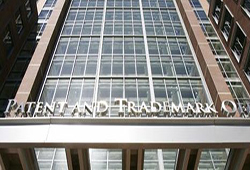 On March 10, 2023, the PTAB denied institution of IPR2022-1524, filed by Apotex Inc. regarding Regeneron’s Patent No. 11,253,572. As we previously reported, Apotex filed an IPR petition against the ’572 patent in September 2022, challenging claims that generally relate to methods for treating angiogenic eye disorders with a claimed dosing regimen of aflibercept. In denying institution, the PTAB focused on language in the claims related to specific improvements in visual acuity, and found that Apotex’s challenge “insufficiently addressed the issue of inherent anticipation” by the prior art disclosures. The PTAB explained that it concluded that Apotex did not “demonstrate a reasonable likelihood it would prevail in showing that any challenged claim of the ’572 patent is unpatentable under the presented grounds.”
On March 10, 2023, the PTAB denied institution of IPR2022-1524, filed by Apotex Inc. regarding Regeneron’s Patent No. 11,253,572. As we previously reported, Apotex filed an IPR petition against the ’572 patent in September 2022, challenging claims that generally relate to methods for treating angiogenic eye disorders with a claimed dosing regimen of aflibercept. In denying institution, the PTAB focused on language in the claims related to specific improvements in visual acuity, and found that Apotex’s challenge “insufficiently addressed the issue of inherent anticipation” by the prior art disclosures. The PTAB explained that it concluded that Apotex did not “demonstrate a reasonable likelihood it would prevail in showing that any challenged claim of the ’572 patent is unpatentable under the presented grounds.”
As we previously reported, in November 2022, in IPRs brought by Mylan, the PTAB issued final written decisions finding claims of two other Regeneron patents directed to treating angiogenic eye disorders (U.S. Patent Nos. 9,254,338 and 9,669,069) to be unpatentable. In January 2023, the PTAB also instituted IPRs of two more petitions brought by Mylan, challenging U.S. Patents Nos. 10,130,681 and 10,888,601, also generally directed to treating angiogenic eye disorders.
In February 2023, Celltrion and Samsung also filed IPR petitions challenging the ’601 and ’681 patents. In conjunction with Samsung’s petition for the ’601 patent, and both of Celltrion’s petitions, Samsung and Celltrion filed motions to join their IPRs with the already-instituted IPRs of the ’601 and ’681 patents that were filed previously by Mylan. On March 10, 2023, Regeneron filed an Opposition to Samsung’s motion for joinder of the IPRs on the ’601 patent. In its Opposition, Regeneron contests whether Samsung has committed to taking a “true understudy role” in the joined proceedings with sufficient clarity to allow for joinder without prejudice to Regeneron. Regeneron has not opposed either of Celltrion’s motions for joinder with the Mylan IPRs.

